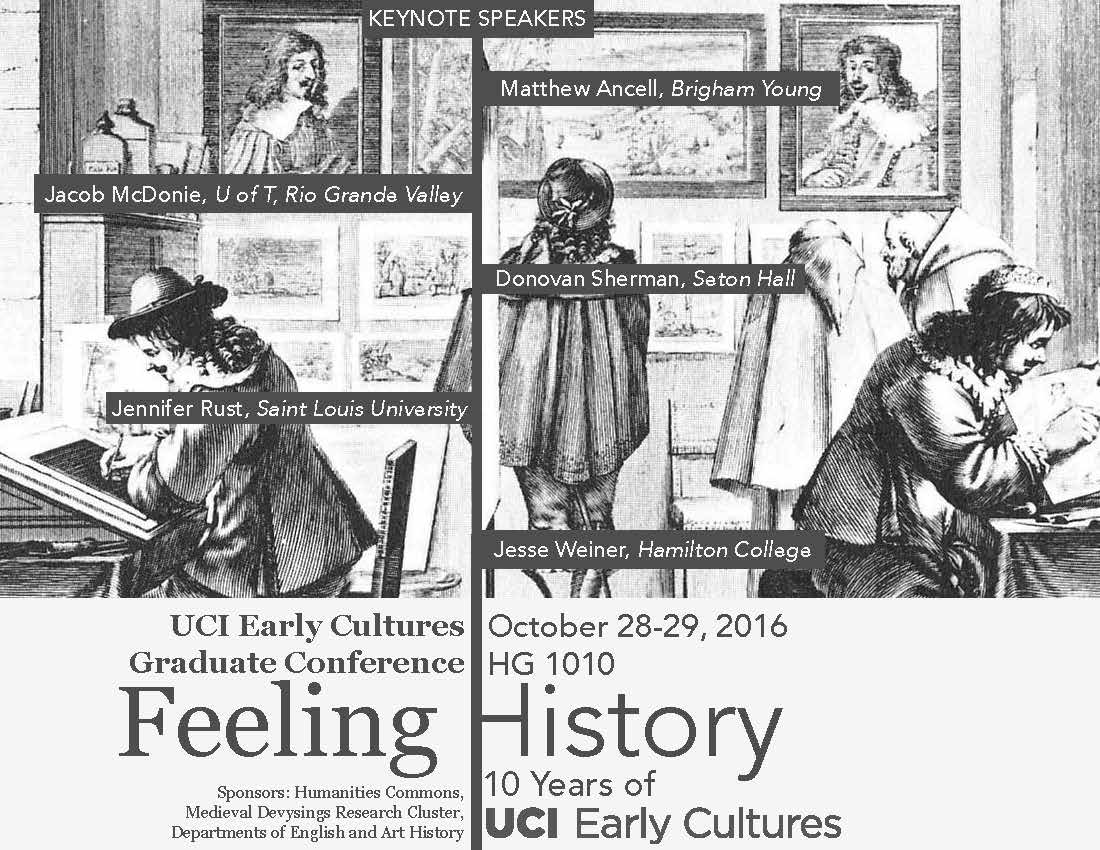Early Cultures Tenth Anniversary Graduate Student Conference
Department: Comparative Literature
Date and Time: October 28, 2016 - October 29, 2016 | 8:00 AM-9:00 AMEvent Location: TBA (HG1010?)
Event Details

Early Cultures Graduate Student Conference
Feeling History
University of California, Irvine
October 28-29, 2016
Keynote Panel featuring UCI PhDs in Early Cultures
Jennifer Rust, St. Louis University (UCI PhD English, Early Modern)
Jesse Weiner, Sherman College (UCI PhD Classics)
Jacob McDonie, University of Texas Pan American (UCI PhD English, Medieval)
Donovan Sherman, Seton Hall University (UCI PhD Drama)
Matthew Ancell, Brigham Young University (UCI PhD Comp Lit)
Abstracts due: August 1st to early.cultures.conference@gmail.com
Because 2016 marks the ten-year anniversary of the founding of the Group for the Study of Early Cultures at the University of California, Irvine, this year’s graduate conference will both reflect on the institutional history of our group and examine the status of history in the study of early cultures more generally. From the Annales School to the New Historicism, from Erich Auerbach’s existential philology to Bruce Smith’s historical phenomenology, medieval and early modern studies have long been sites of theoretical and methodological innovation. However, the attempt to join “theory” and “method” raises a question that concerns not only literary studies but historical inquiry proper: to what extent can theoretical frameworks—which inevitably demand some level of abstraction—capture the multiplicity of empirical history, not only when it comes to the social, economic, and cultural particularities that define an era but also where culturally specific structures of sensation and embodied experience are concerned? Moreover, in what ways does the predominant focus on the West in our discipline come at the expense of global cultures, conceived either as the mutually constitutive relationship between Europe and its “others” or the autonomous development of non-Western antiquities in their own right?
In order to address these questions, our conference seeks to establish a capacious understanding of “history,” one that explores not only the historical conditions that inform the productions of texts, literary and otherwise, but also the ways in which history functions as a methodological and philosophical category and how the role of historical consciousness shapes early texts themselves. Possible paper topics may include:
-The representation of history in early texts
-The relationship, antagonistic or complementary, between history and more “theoretical” approaches (phenomenology, psychoanalysis, post-structuralism, etc.)
-The institutional history of the study of early cultures
-The interaction between social/economic history and the history of ideas
-The ethics of history
-Social history vs. political history
-Quantitative vs. qualitative approaches to history
Abstracts: Those wishing to participate must submit an abstract of no more than 300 words and a one page CV to
early.cultures.conference@gmail.com by August
